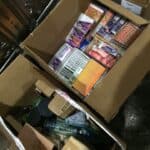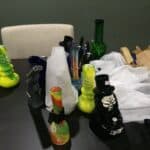
18 Aug A CIVIL FORFEITURE IN MCALESTER OKLAHOMA
A CIVIL FORFEITURE IN MCALESTER OKLAHOMA
THE RAID OF THE FUNKY MUNKY
On July 7, 2014 a joint task force of officers identifying themselves as local, state and federal agents entered the Funky Munky, a novelty store located on Carl Albert Parkway in McAlester Oklahoma. The agents were there to serve a search warrant, and according to that search warrant, they were there to confiscate synthetic controlled dangerous substances as defined by Oklahoma statute (63 O.S. Sec.2-204 (F)), documents that would show the sale and distribution of such substances, and paraphernalia used for the ingestion of controlled dangerous substances. I will not hold the reader in suspense for the entirety of this story; they found no such items, but they did find property and money. The government took this property and money and this is what the story of the Funky Munky is truly about.
As most of those people that follow our posts know, the “War on Drugs” and civil forfeiture (two separate governmental functions and policies most closely tied together by their frequent abuse) go hand in hand. And as most of our readers know I believe the abuse of these two functions of government, for lack of a better description, have led to the infringement of the rights of free people more frequently than their stated goal of crime reduction. The story of the Funky Munky is proof.
The Funky Munky located at 522 W. Carl Albert Parkway, McAlester, Oklahoma, is a novelty shop. They sell funny t-shirts, décor, incense, smoking devices, and adult items. They are a family-owned business in the traditional sense. Originally started by Marlene Beene, she handed the day-to-day ownership and operations over to her daughter Sommer Wright in the summer of 2014. Marlene originally got the idea for the Funky Munky when she wanted to purchase novelty items for Sommer’s bachelorette party. Marlene noticed that there were no local stores in the area that carried items one would generally have for such an adult themed event. As is usually the case a void in the market becomes noticed and an entrepreneur will step up to the plate offer to fill that void, and if the market sustains it, then it will survive. That is exactly what happened in the case of the Funky Munky. The store caters to that fringe consumer, the hippie, or alternative lifestyler with money to spend, and doesn’t want to travel to a larger city to spend it.
As is generally the case with those who lead their lives different from the accepted “norm”, they will attract the ire of those that disapprove. The same is true of the businesses that serve a niche community as well. And over the years the Funky Munky has been the subject of community disapproval, government concern, unfair oversight, and harassment, all while exercising the perfectly legal right to exist.
By 2013, the State of Oklahoma at large, was enthralled with news reports of a “new kind of high”, that of “synthetic marijuana” or “K2”. As the local news began to run stories of teenagers buying legal incense then smoking it for a high, parents and community leaders began to call for action. Legislators responded by continuously changing the outlawed chemical compound that were classified as controlled and dangerous by statute, and imposing criminal sanctions on anyone who possessed or sold such products. By 2013 it had become abundantly clear that the legislature could not keep up with the commercial producers of the items, which would change the chemical compound of the incense to avoid criminality. And the incense was readily available, sold in gas stations, convenience stores, and novelty shops throughout the state. It would be hard to fault the purveyors of these establishments, most of which were locally, family owned outlets just trying to squeak out a profit by selling a perfectly legal product, which was being used in a way it was not initially designed.
Because the law itself provided little help to solving this dilemma, government agents turned to a more traditional approach to solving the issue, intimidation.
Police officers, drug task force agents, and DEA went into these business and threatened, or as they might describe it educated, legitimate business owners that they were playing with fire and would be subject to raids, pressure and even arrest. All of this, of course, occurred outside the presence of legal counsel or advice and was nothing short of a total misrepresentation of the law. But, many frightened business owners began to pull the items from their shelves, bending to the will of the master they perceived to carry a larger stick.
The Funky Munky, its owners used to such harassment and false threats by law enforcement, didn’t bend to the will of the oppressors so easily. They had already been the subject of “undercover purchases” as long ago as September of 2012.
The Funky Munky did know that they were being squeezed. The intimidation from law enforcement started with stopping patrons as they left the Funky Munky. According to employees and patrons, people would be stopped in their vehicles, their cars searched, and then told by officers that if they continued to patronize the Funky Munky they would eventually go to jail. None of these “intimidation” stops (all of which were a clear violation of the 4th Amendment of the United States Constitution) resulted in arrest.
As a result of a recent break-in and the ever increasing encroachment of law enforcement, Sommer installed a security camera system. Nearly a year later that system would come under much scrutiny as it was discovered that the person that installed the system was approached by law enforcement. This man had installed the cameras in a way that would allow the owner to “log in” remotely and view the store through its cameras via phone or other device connected to the internet. Only two people had the information required to log into this system, the man that installed it and the owner of the Funky Munky. Later it would be discovered that some other entity (recognizable by its IP address) log in to the system.
On April 10, 2014 a DEA agent and a County “Drug Task Force” officer entered the Funky Munky and spoke with Marlene Beeane. The agent told Ms. Beeane that the incense and potpourri for sale there was potentially illegal according to Title 63 of the Oklahoma statutes. He explained that on at least two prior occasions incense known to be sold by the Funky Munky had been tested by a laboratory and showed to contain an illegal chemical compound. (A note for the reader: after poring through thousands of pages of documents, lab results, and other reports given to counsel through discovery, would never reveal the existence of such a test and subsequent result.) The agent went on to explain the potential prosecution, criminal punishment, and forfeiture of property for selling illegal controlled substances. The agent further inquired as to the status of ownership and discovered that Sommer, not Marlene was the proprietor. He requested that Marlene get Sommer on the phone, and when she did he re-issued his warning to the owner. When the conversation was finished, he addressed Marlene again and advised her that even though she was not the owner of the business, that by allowing such sales to occur in her presence she may be criminally liable and potentially be forced to testify as a witness against her own daughter. Satisfied that they had instilled the requisite amount of fear and intimidation necessary to complete their task, the agents exited through the same door from which they entered.
Trash collections, undercover purchases, by agents and local snitches motivated by their own pending prosecutions continued. Sommer and her husband, a successful business man in the oil and gas industry as well as a law student, sought legal advice from local counsel. They were advised that they were in fact not breaking the law, but that the pressure from the government would probably not just go away. When you are used to the judgment and intimidation of others, you don’t tend to give up or retreat easily, and that was the case for the Funky Munky, they continued business as usual, after all they had done nothing wrong.
On July 7, 2014, Agents put their theories, accusations, and conclusions from trash collections, statements of informants, explanations of undercover purchases, and other hyperbole into a narrative and presented it to a magistrate for a warrant. The narrative included the conclusion that the Funky Munky was involved in the sale and distribution of illegal substances, specifically synthetic marijuana (although the warrant application eluded to no chemical analysis of any products known to have been purchased at the Funky Munky). The warrant was signed, absent any actual evidence of substances outlawed by statute or even cause to believe the Funky Munky had ever distributed or possessed substances outlawed by statute.
On that same day the search warrant was served. Agents came into the Funky Munky and began to go through everything. They seized business records, took pictures, and carried out thousands of dollars’ worth of merchandise. They seized all of the smoking accessories they could find, claiming it to be paraphernalia. They collected all of the incense, sure that it would yield the results they desired. But, depleting the store of its inventory wasn’t enough, agents, equipped with their warrant moved in for the kill, they went to the bank and seized all of the money. They seized $70,000.00 from a bank account, money belonging to Marlene Beeane, transferred to her recently by her daughter Sommer for the purchase of the Funky Munky. Agents seized more money from bank accounts, nearly another $70,000.00 this time belonging to Sommer and Don. The government claimed that these monies were connected to a criminal activity and therefore subject to seizure through civil forfeiture.
No arrests were made. The agents came in, took property and left. Months would pass, it wouldn’t be until October of that year that the Pittsburg County District Attorney’s office got around to suing the currency collected in an effort to seize it permanently. Still no criminal charges were filed. Shortly after the District attorney moved to request forfeiture of the currency, Don Wright filed an answer (Pro Se, which means without licensed legal representation) alleging, among other things that the government had illegally seized this property and therefore was effectively trying to steal it from its rightful owners. Still no criminal charges were filed.
In May of 2015, I met Sommer on unrelated business, and when began to discuss the seizure of the Funky Munky’s property. I offered my assistance, and she seemed hesitant and advised that her husband was studying the practice of law, and had been their primary advocate. I politely offered my assistance in the future if she ever felt she needed it. It was just a couple of days later that I received a phone call from Don, and he wanted to ask me what I thought of the situation. I chose a direct approach, which is my common way, and advised him that I felt, given what he had told me, that the government had stolen his money and property. We concluded our conversation with the intention to speak again soon.
It was few days later when Don and Sommer came into our office to discuss the matters more thoroughly and possibly agree to terms for our representation. We talked about not only the case itself, but family and business, and discovered our mutual agreement of traditional constitutional values and freedom. Both myself and Mr. Lynch, vowed that we would fight for them. We vowed that we would not be intimidated or cower to intimidation, and do everything in our power to win.
On June 9, 2015, we gave the government notice that we were now representing the Wrights and Ms. Beeane and began requesting hearings and discovery. As expected we were met first with the threat of prosecution. At this point nearly a year had a half had passed since the raid of the Funky Munky and no criminal charges had ever been filed. Unflinchingly, we continued to demand documents, and issued subpoenas. The threat of criminal prosecution floating above more like a fictitious spirit animal, rather than anything real and tangible. Why? Because we had discovered that it was very unlikely that the government could ever prove that anyone employed or associated with ownership of the Funky Munky had committed a crime.
We treated the case as what it was, a civil case. The nuances of the situation, applicable civil procedure with the looming possibility of a criminal defense, fit the individual and therefore collective wheelhouse of our firm perfectly.
When the state didn’t fully comply with the subpoena, we filed an application for contempt. When our questions regarding law enforcement were not answered timely enough, we scheduled a deposition for the officer himself. We filed motions, we set hearings, and we made it clear we were not going anywhere without a fight. When we scheduled the agent for a deposition (a deposition is when a potential witness is placed under oath and asked questions by the opposing counsel, this is for the purpose of discovery), we suddenly received a letter from the Drug Enforcement Agency in Washington D.C. The letter claimed that we had not followed proper procedure under a federal act. So we stopped what we were doing, familiarized ourselves with the requirement, complied and informed the government there would be no reason for delay.
It was clear that the government was stalling, concealing, hiding, and throwing up roadblocks all in effort to persuade us to accept defeat and go away.
On the eve of the deposition in question, we got a phone call. The District Attorney’s office wanted to settle. Over the course of the next few days, with the permission of our clients, we drafted an agreement. The agreement forbid any state or federal agency from attempting to criminally prosecute anyone in connection with their investigation, they had to return most of the money, all of the merchandise that was seized, and an ongoing federal lawsuit against the county would not be dismissed.
The government agreed, and on the 20th of July, 2015 delivered to the offices of Wagner & Lynch several cardboard boxes, sealed, with the marking “DEA EVIDENCE”. We did an inventory of the items contained in those boxes and found numerous pieces of merchandise, personal and business records, and Sommer’s most prized possession, her cell phone, which contained pictures of her children and family. After completing an inventory of all of the items, we turned them over to their rightful owners, Don and Sommer Wright.
CONCLUSION
I know that this story may raise some controversy. There are many that would read this and say, well they had that coming to them. The Funky Munky is used to that kind of reaction, after all they do serve that fringe element. But, at the end of the day it’s just a store, no one has ever been forced to go into their store, they have not broken the law, and a free market demand sustains its viability. I can tell you that over the course of this particular investigation I have found no evidence to suggest that anyone associated with the Funky Munky, either employees or proprietors, have ever lied, misled, falsely accused, hacked into any secured computer system illegally, coerced others for information, omitted relevant facts to a court of law, stalled, concealed evidence, or were controlled by their greed. I cannot say that about anyone else associated with the seizure of Funky Munky property.









No Comments